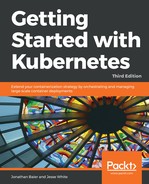The cluster control plane, otherwise known as the Master, makes global decisions based on the current and desired state of the cluster, detecting and responding to events as they propagate across the cluster. This includes starting and stopping pods if the replication factor of a replication controller is unsatisfied or running a scheduled cron job.
The overarching goal of the control plane is to report on and work towards a desired state. The API that the master runs depends on the persistent state store, etcd, and utilizes the watch strategy for minimizing change latency while enabling decentralized component coordination.
Components of the Master can be realistically run on any machine in the cluster, but best practices and production-ready systems dictate that master components should be co-located on a single machine (or a multi-master high availability setup). Running all of the Master components on a single machine allows operators to exclude running user containers on those machines, which is recommended for more reliable control plane operations. The less you have running on your Master node, the better!
We'll dig into the Master components, including kube-apiserver, etcd, kube-scheduler, kube-controller-manager, and cloud-controller-manager when we get into more detail on the Master node. It is important to note that the Kubernetes goal with these components is to provide a RESTful API against mostly persistent storage resources and a CRUD (Create, Read, Update, and Delete) strategy. We'll explore the basic primitives around container-specific orchestration and scheduling later in this chapter when we read about services, ingress, pods, deployments, StatefulSet, CronJobs, and ReplicaSets.
